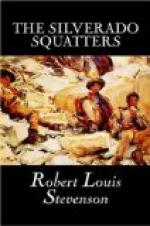The leading spirit of the family was, I am inclined to fancy, Mrs. Hanson. Her social brilliancy somewhat dazzled the others, and she had more of the small change of sense. It was she who faced Kelmar, for instance; and perhaps, if she had been alone, Kelmar would have had no rule within her doors. Rufe, to be sure, had a fine, sober, open-air attitude of mind, seeing the world without exaggeration—perhaps, we may even say, without enough; for he lacked, along with the others, that commercial idealism which puts so high a value on time and money. Sanity itself is a kind of convention. Perhaps Rufe was wrong; but, looking on life plainly, he was unable to perceive that croquet or poker were in any way less important than, for instance, mending his waggon. Even his own profession, hunting, was dear to him mainly as a sort of play; even that he would have neglected, had it not appealed to his imagination. His hunting-suit, for instance, had cost I should be afraid to say how many bucks—the currency in which he paid his way: it was all befringed, after the Indian fashion, and it was dear to his heart. The pictorial side of his daily business was never forgotten. He was even anxious to stand for his picture in those buckskin hunting clothes; and I remember how he once warmed almost into enthusiasm, his dark blue eyes growing perceptibly larger, as he planned the composition in which he should appear, “with the horns of some real big bucks, and dogs, and a camp on a crick” (creek, stream).
There was no trace in Irvine of this woodland poetry. He did not care for hunting, nor yet for buckskin suits. He had never observed scenery. The world, as it appeared to him, was almost obliterated by his own great grinning figure in the foreground: Caliban Malvolio. And it seems to me as if, in the persons of these brothers-in-law, we had the two sides of rusticity fairly well represented: the hunter living really in nature; the clodhopper living merely out of society: the one bent up in every corporal agent to capacity in one pursuit, doing at least one thing keenly and thoughtfully,




